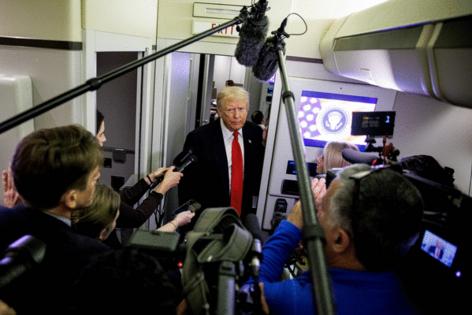Trump's military threat doesn't reflect reality of violence in Nigeria
Published in News & Features
Nigeria reeled on Monday from U.S. President Donald Trump’s claim over the weekend that Christians are being systematically killed in the West African country, with blanket coverage across local media.
“They’re killing the Christians and killing them in very large numbers,” Trump said in comments while traveling on Air Force One on Saturday. “We’re not going to allow that to happen.”
The false idea of a genocide against Christians in Nigeria has been floating around right-wing circles in the West for years, and was brought up by Trump during his first term in power. But it has gained particular traction in recent months, prompting rising concern in Africa’s most populous country.
The nation of 230 million — roughly split between Muslims and Christians — has a long history of ethnic violence driven by access to resources such as land and water, and terrorism by the likes of Boko Haram and Islamic State that largely kills Muslims.
On Sunday, President Bola Tinubu said his government was committed to working with the U.S. and international community to protect all faiths. But “the characterization of Nigeria as religiously intolerant does not reflect our national reality,” he added. Tinubu is Muslim; his wife is a Christian pastor.
On Monday morning, Nigeria’s sovereign dollar bonds posted some of the biggest losses among emerging-market peers.
Escalating rhetoric
Trump’s intervention — and his threat to use military force and cut off all aid — marks an escalation amid claims from U.S. right-wing politicians, commentators and European lawmakers that citizens are being targeted for their religion.
More than 20,000 people were killed in political violence in Nigeria between January 2020 and this September, according to Acled, which tracks such incidents around the world. Of the nearly 12,000 attacks in that period, the vast bulk were not religiously-motivated.
Trump posted a message from Defense Secretary Pete Hegseth on Sunday saying the U.S. military was “preparing for action.” “Either the Nigerian Government protects Christians, or we will kill the Islamic Terrorists who are committing these horrible atrocities,” Hegseth said.
The U.S. leader could move warships near Nigeria’s coast if he decides to strike the country. With Venezuela, where Trump has threatened action over alleged drug smuggling, Washington has sent more naval assets to the southern Caribbean. Yet so far, there have been no reports of it making similar moves in West African waters.
“The false claim that the U.S. could quickly resolve Nigeria’s security issues by putting troops on the ground reveals how little Trump understands about the world,” Nic Cheeseman, professor of democracy at the University of Birmingham, said. “It also illustrates the risks that arise when those around him feed him information and send him off in whatever direction they want to as they wage their strange culture wars.”
South Africa echoes
Trump’s comments echo his claims there’s a genocide against White Afrikaner farmers in South Africa, which led him to offer them refugee status in the U.S.
It’s not clear he’ll do the same with Nigerian Christians, but Abuja now faces a similar challenge to Pretoria — persuading a president who rarely backs down from a claim, no matter its credibility, that he’s wrong.
Trump’s decision to turn on Nigeria’s leaders follows recent moves from U.S. Senator Ted Cruz — who introduced a bill in September to protect Nigerian Christians — Congressman Riley Moore and comedian Bill Maher.
Maher claimed on his HBO show last month, without evidence, that 100,000 Nigerian Christians had been “systematically” killed by Boko Haram since 2009.
“They are literally trying to wipe out the Christian population of an entire country,” Maher said.
Last month, Nigeria’s Information Minister Mohammed Idris said such claims were “despicable narratives being peddled by people who know nothing about Nigeria.”
Widespread violence
The reality is that while there is religious violence in Nigeria, most of it is based on resources and criminality.
The predominantly Muslim north has been by far the most impacted, with criminal bandits in the northwest and Islamists in the northeast wreaking havoc.
Where the violence does shade into religion is in the central region, where mostly Muslim nomadic cattle herders clash with crop farmers, who are largely Christian. But those long-running conflicts are at their root about diminishing access to farmland and water in one of the poorest places on earth, worsened by climate change pushing the edge of the Sahara desert further south.
Like his predecessors, Tinubu has largely failed to tackle the country’s security crisis. He recently shuffled his defense chiefs, but little has changed.
The violence, which has rendered large parts of the country effectively stateless, is a reflection of the utter failure of the government to protect its people, said Cheta Nwanze, a partner at the Lagos-based SBM Intelligence research firm.
“The damage to the current administration’s economic efforts could be significant following” Trump’s remarks, Nwanze said. “But my main advice to Nigeria is to focus on securing the lives of its citizens rather than trying to look good in front of the world.”
Trump is catering to his evangelical base in the U.S. and possibly using leverage to extract mining and oil deals down the line, said Vincent Foucher, a researcher at France’s National Center for Scientific Research and an expert on insurgent groups in Nigeria. Nigeria is Africa’s biggest oil producer and has plenty of minerals, though thanks to years of mismanagement it has never been a mining power.
It “fits very well with Trump’s transactional approach,” Foucher said. “At some point, there may well be discussions between Nigeria and the U.S. over certain U.S. economic interests, such as rare earth minerals and oil.”
Sign up here for the twice-weekly Next Africa newsletter, and subscribe to the Next Africa podcast on Apple, Spotify or anywhere you listen.
---------
—With assistance from Robert Brand, Paul Wallace, Katarina Höije and Mike Cohen.
©2025 Bloomberg L.P. Visit bloomberg.com. Distributed by Tribune Content Agency, LLC.







Comments